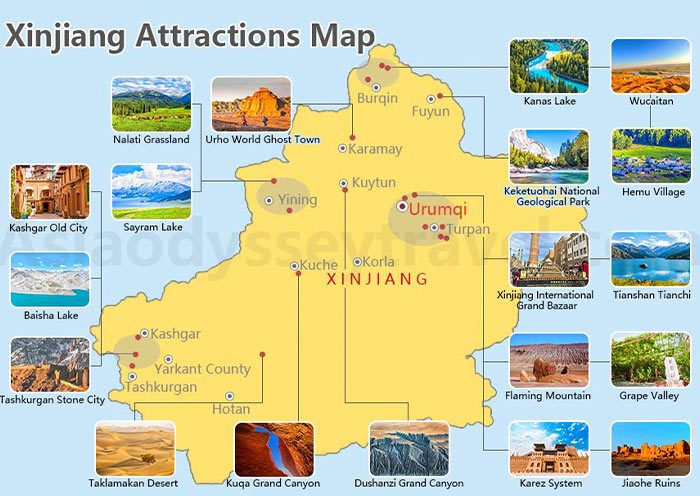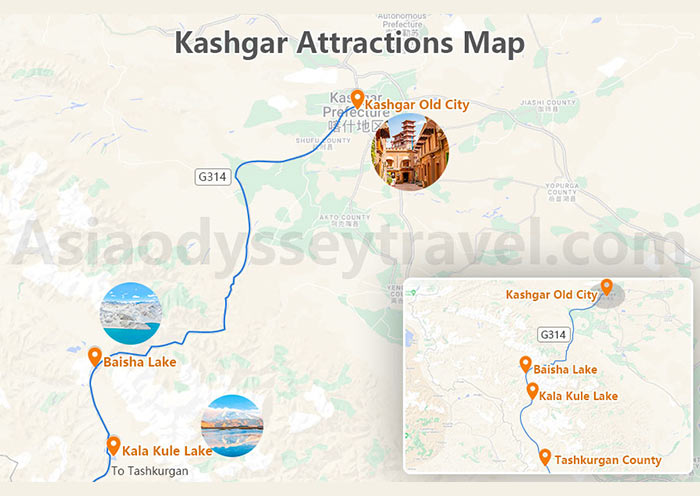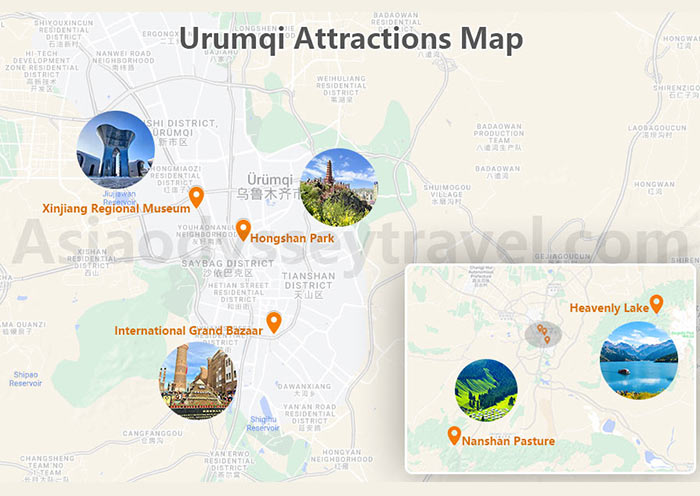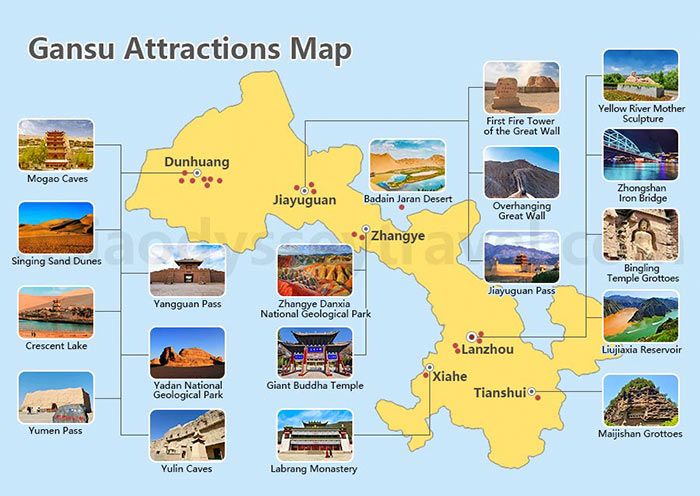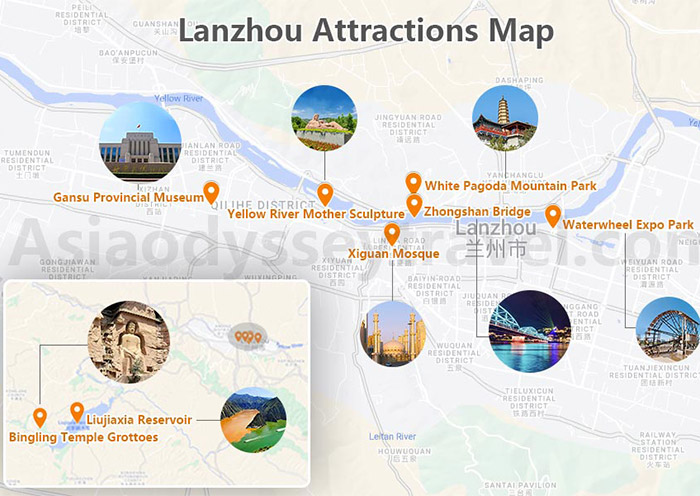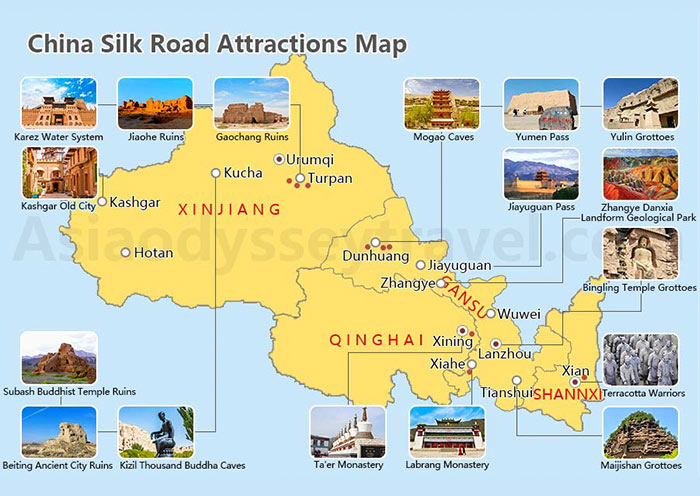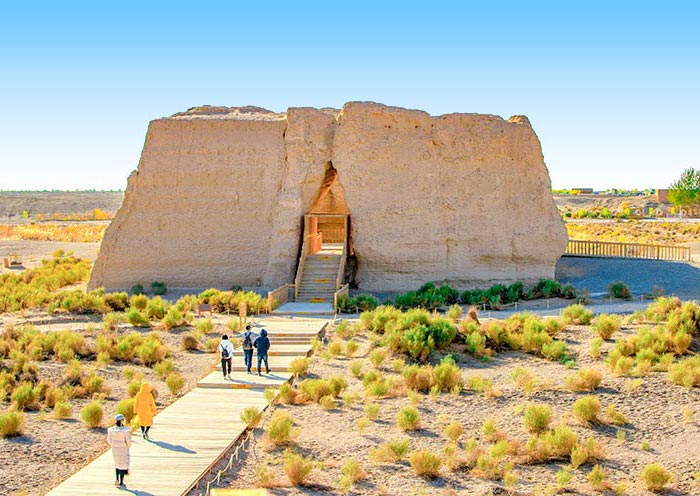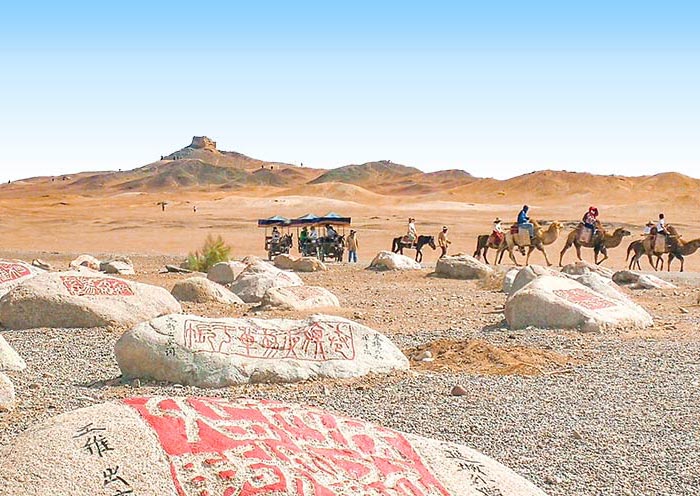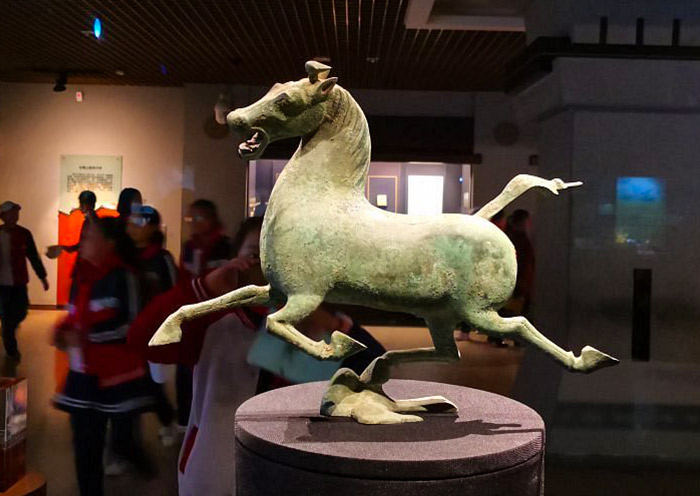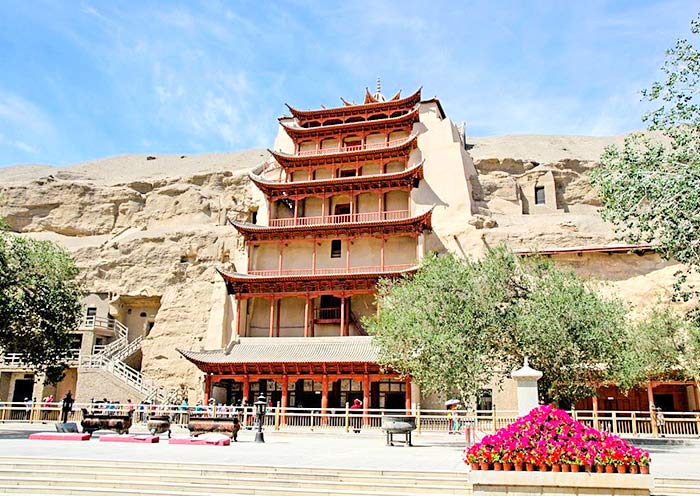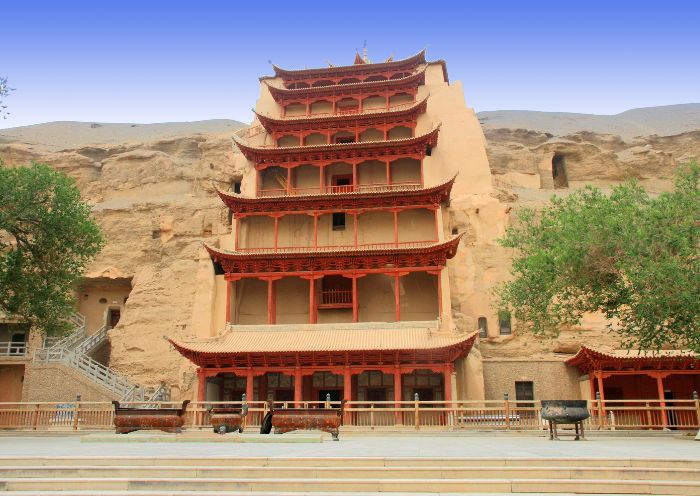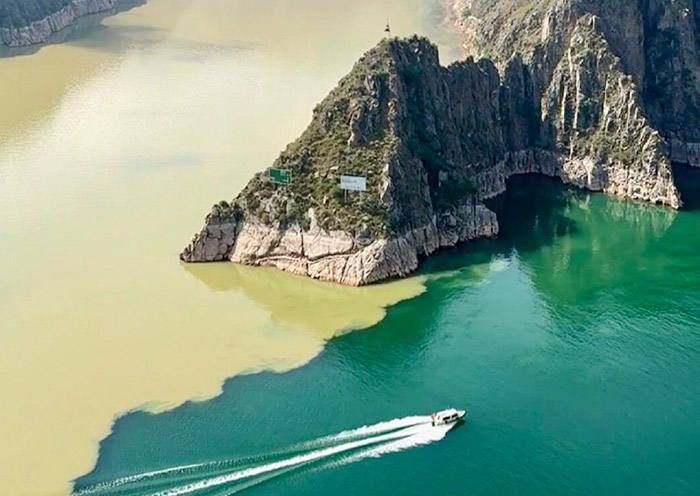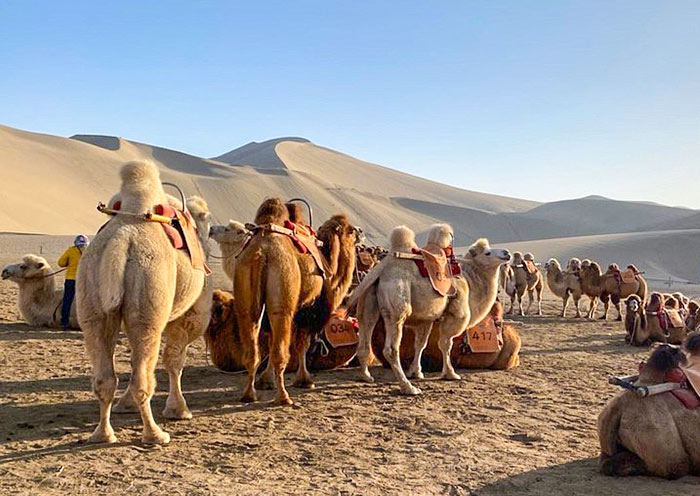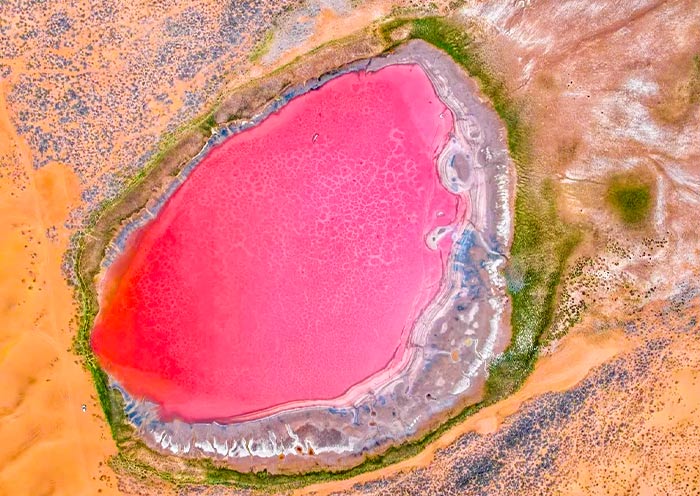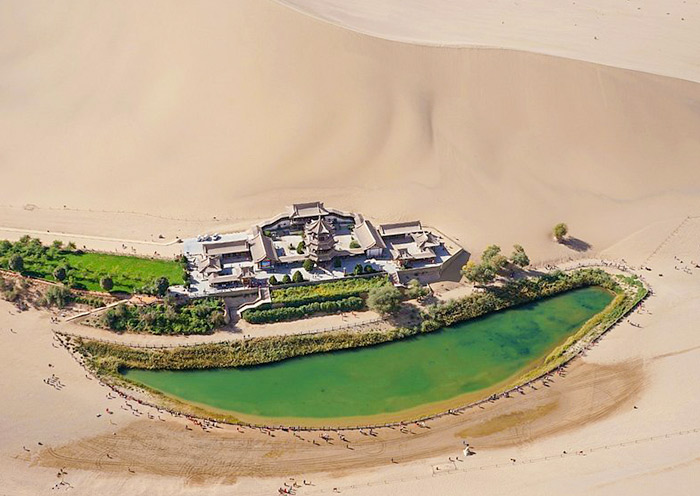Dunhuang Location Map: Dunhuang Location in Silk Road Map
Dunhuang Location in Gansu Province
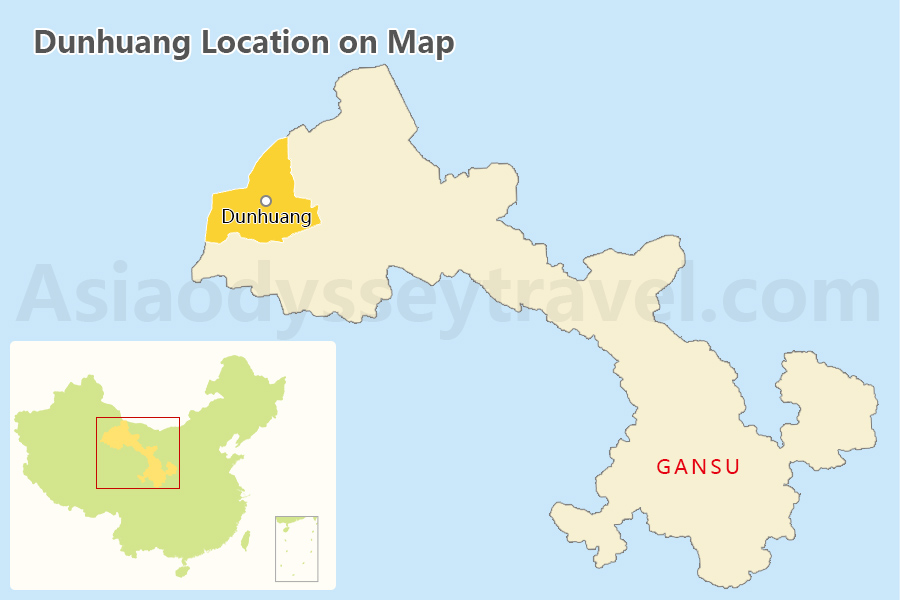
Dunhuang is a city located in the Gansu Province of northwest China. Known for its historical significance and cultural heritage, Dunhuang is famous for the Mogao Caves, also known as the Thousand Buddha Grottoes, which house a vast collection of Buddhist art spanning over a thousand years. The city is a popular tourist destination due to its rich history, stunning desert landscapes, and archaeological sites.
Dunhuang Location in Silk Road Map
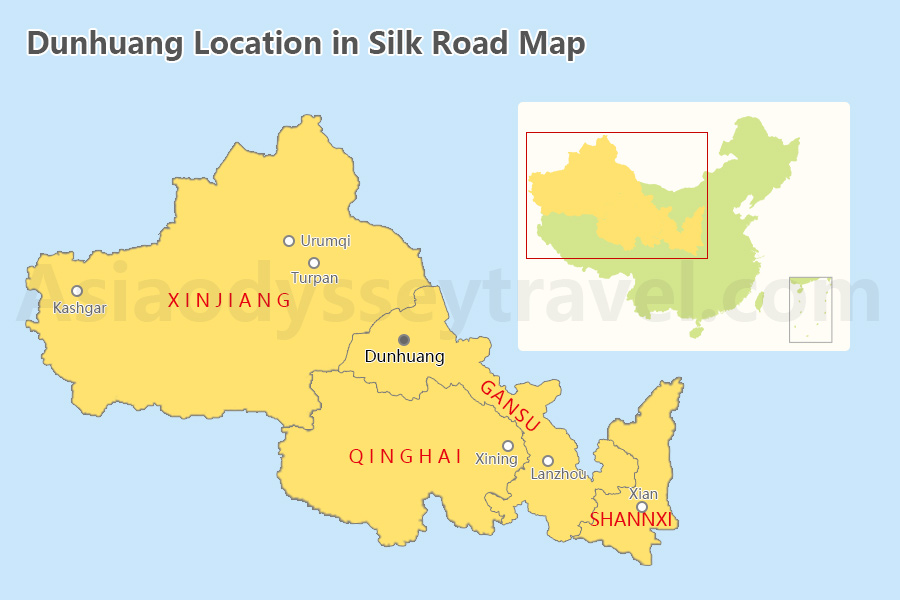
Dunhuang occupies a pivotal position along the ancient Silk Road, serving as a crucial hub for trade, cultural exchange, and religious interactions. Situated at the crossroads of northern and southern routes of the Silk Road, Dunhuang played a significant role in connecting East and West, facilitating the exchange of goods, ideas, and technologies between civilizations.
Dunhuang City Map with Airport & Stations
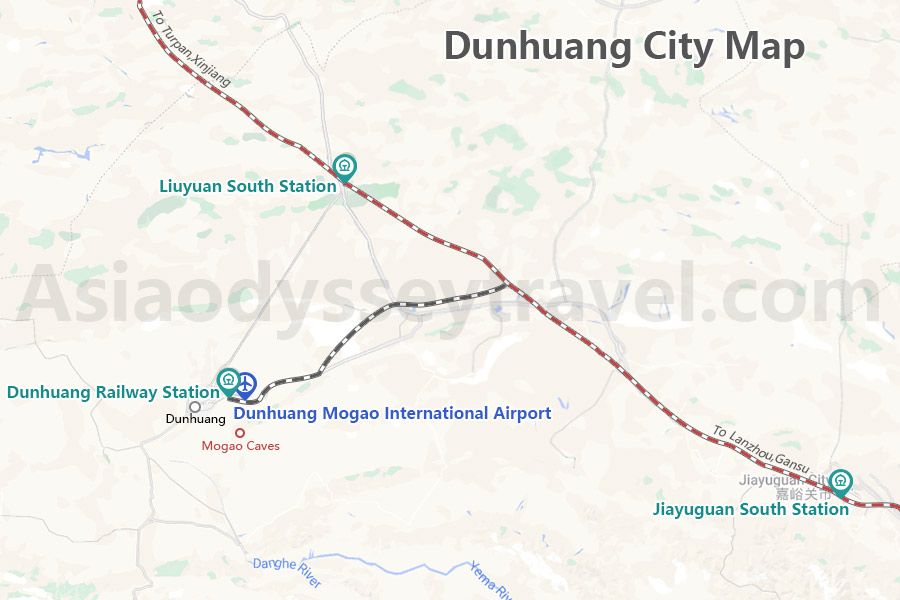
Dunhuang Mogao International Airport (DNH): The Dunhuang Airport serves the city with domestic flights connecting to major cities in China. It is located about 13 kilometers (8 miles) east of downtown Dunhuang.
Dunhuang Railway Station: Dunhuang Railway Station is located in Dunhuang City, 20 km away from Mogao Caves. It provides convenient rail connections to cities like Jiayuguan, Zhangye, Lanzhou and Xian.
Liuyuan South Station (柳园南站): The Liuyuan South Station is another railway station 130 km away from Dunhuang City. It’s an important stop on the Lanzhou-Xinjiang High-Speed Railway. It provides convenient rail connections to cities in Xinjiang like Urumqi, Turpan, and Hami.
Dunhuang Tourist Map: Top Attractions in Dunhuang
Dunhuang is rich in historical and cultural attractions. Here are some of the top attractions in Dunhuang on Map:
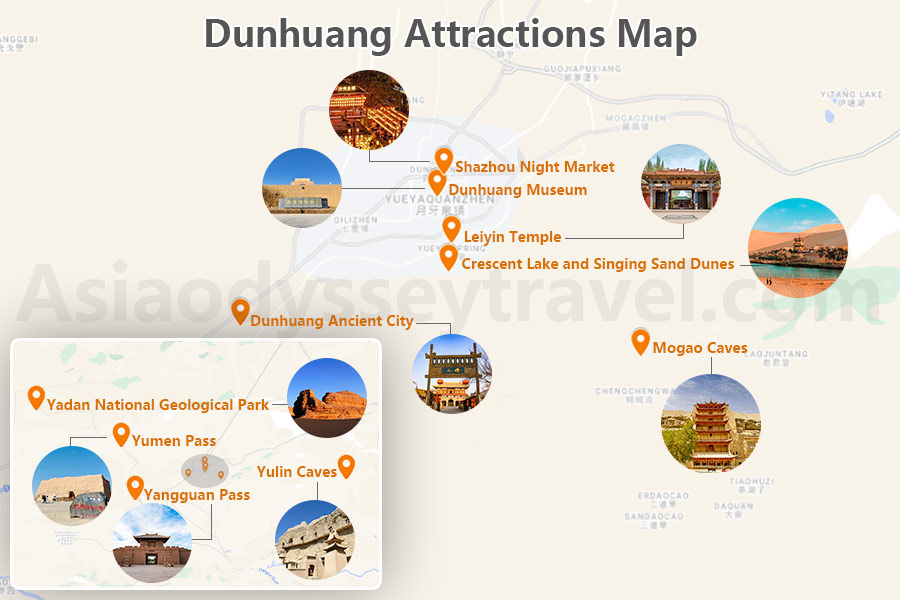
- Mogao Caves (Mogao Grottoes): One of Dunhuang's most famous sites, the Mogao Caves house a vast collection of Buddhist art spanning over a thousand years. The caves feature exquisite murals, sculptures, and manuscripts, making them a UNESCO World Heritage Site.
- Crescent Lake (Yueyaquan) and Singing Sand Dunes (Mingshashan): This scenic area is characterized by a crescent-shaped lake surrounded by massive sand dunes. Visitors can ride camels, climb the dunes, and witness the unique phenomenon of the sand dunes "singing" in certain conditions.
- Yumen Pass (Jade Gate Pass): An ancient strategic pass along the Silk Road, the Yumen Pass offers a glimpse into the region's historical importance. The ruins of the pass and nearby Han Dynasty Great Wall remnants provide insight into the past.
- Yangguan Pass: Another significant pass along the ancient Silk Road, Yangguan Pass offers historical insights and scenic views. Visitors can explore the ruins of the pass and imagine the bustling trade activities that once took place here.
- Dunhuang Museum: This museum showcases artifacts and exhibits related to Dunhuang's history, culture, and the Silk Road. It offers a deeper understanding of the region's role in the exchange of goods, ideas, and cultures.
- Shazhou Night Market: A vibrant market where visitors can sample local foods, shop for souvenirs, and experience the lively atmosphere of Dunhuang's night scene. It's a great place to try regional delicacies and interact with locals.
- Dunhuang Ancient City: Explore the remnants of the ancient city walls and gates, which once served as a key stop on the Silk Road. The city's layout and architecture reflect its historical significance as a hub of trade and cultural exchange.
- Yadan National Geological Park: The Yadan National Geological Park is a unique natural landscape located in Dunhuang. Yadan landforms are characterized by wind-eroded rock formations that resemble various shapes and sculptures, creating a surreal and picturesque environment.
- Yulin Caves (榆林窟): Yulin Caves, often referred to as the "sister caves" of the Mogao Caves, are renowned for their exquisite murals and rich cultural heritage. Situated in the Yulin River Gorge of Guazhou County, they complement the Mogao Caves, jointly forming a magnificent landscape of Dunhuang grotto art.
- Leiyin Temple (雷音寺): Leiyin Temple, also known as the Temple of Thunder Sound, is a historic Buddhist temple close to Mogao Caves in Dunhuang. It showcases traditional Chinese architecture and Buddhist art.
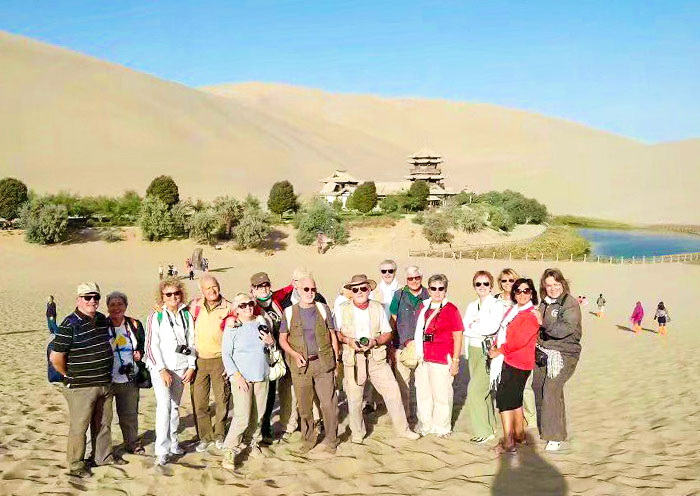
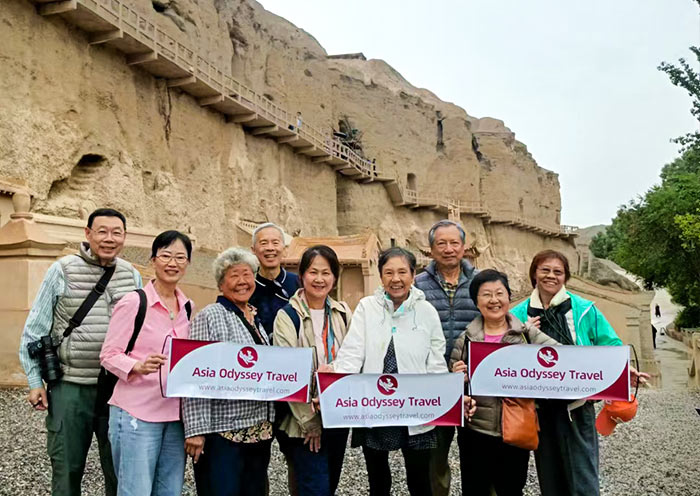
These attractions showcase Dunhuang's rich history, cultural heritage, and natural beauty, making it a must-visit destination for travelers interested in exploring the Silk Road and experiencing the wonders of the Gobi Desert region.
Mogao Caves Map in Dunhuang
The Mogao Caves, also known as the Mogao Grottoes or the Caves of the Thousand Buddhas, are a UNESCO World Heritage Site located in Dunhuang. These caves are renowned for their exquisite Buddhist art and represent one of the most significant cultural and religious sites along the ancient Silk Road.
- History: The caves were constructed between the 4th and 14th centuries, making them one of the oldest and best-preserved Buddhist cave temple complexes in the world.
- Number of Caves: There are over 492 caves, each with unique murals, sculptures, and architecture.
- Murals and Sculptures: The caves are adorned with thousands of colorful murals and sculptures depicting scenes from Buddhism, Chinese history, and mythology.
- Library Cave: Discover the famous Library Cave, also known as Cave 17, where a vast collection of ancient manuscripts, silk paintings, and artifacts were discovered
Dunhuang Mogao Caves: Facts, Location, Map, Tickets of Mogao Grottoes
Dunhuang Transportation Map
Dunhuang to Jiayuguan Map
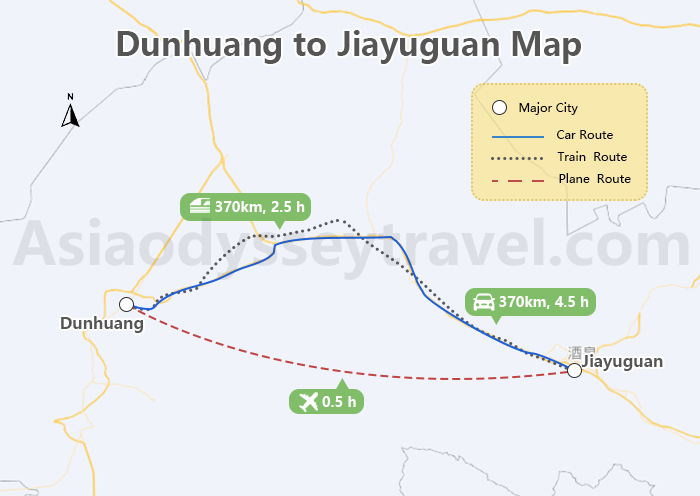
Jiayuguan, known as the "First Pass Under Heaven", marks the western end of the Great Wall of China. It's a popular destination in Gansu for history buffs and those interested in the Silk Road. The distance between Dunhuang and Jiayuguan is about 370 kilometers. You can travel by car for 4-5 hours, or take a D-Type High-Speed Train from Dunhuang to Jiayuguan for 2.5 hours.
Dunhuang to Jiayuguan: 3 Ways from Dunhuang to Jiayuguan (Car, Train & Bus)
Dunhuang to Zhangye Map

Zhangye is another popular tourist destination in Gansu, renowned for its stunning Danxia landforms, a colorful geological wonder. The distance between Dunhuang and Zhangye is approximately 400 kilometers. You can travel by car for 6-7 hours, or take a D-Type High-Speed Train from Dunhuang to Zhangye for 4 hours.
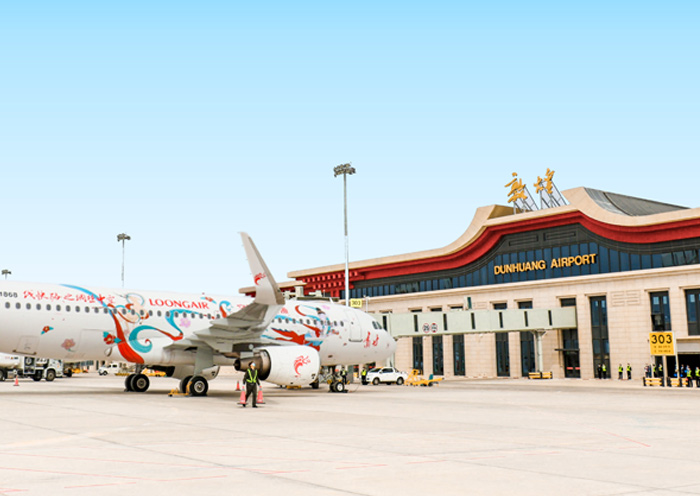
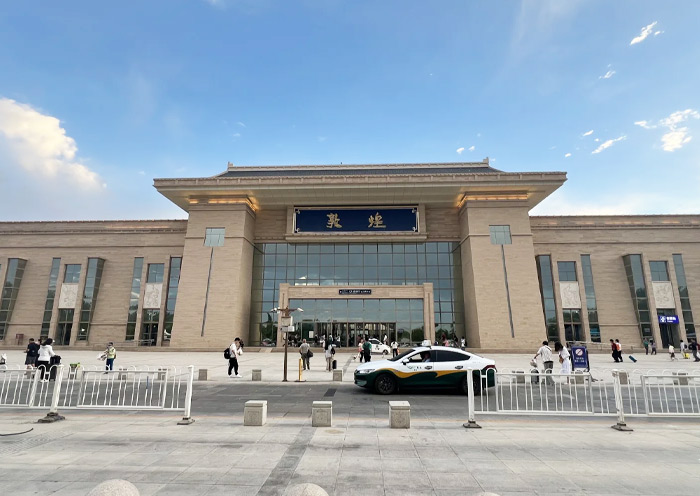
Dunhuang to Turpan
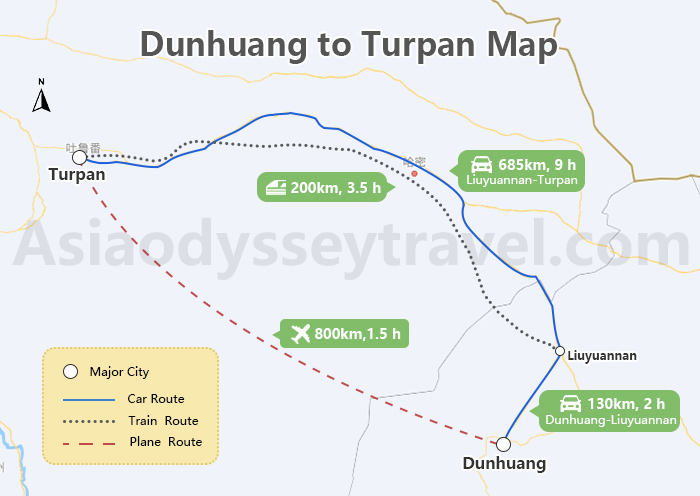
Turpan, a historic oasis city located in the Eastern Xinjiang, is one of the hottest places on Earth. It’s another popular tourist destination along the ancient Silk Road, renowned for Jiaohe Ruins and Karez Systems. The distance between Dunhuang and Turpan is about 800 kilometers. You can take a D-Type High-Speed Train from Liuyuannan (柳园南) to Turpan for 3.5 hours.
Dunhuang to Turpan: 3 Best Ways to Reach Turpan from Dunhuang
Dunhuang Travel Map: Travel to Dunhuang With Map
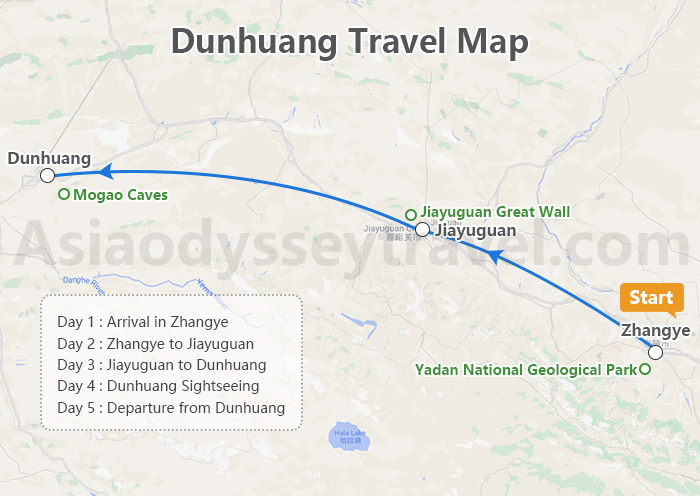
Day 1: Arrival in Dunhuang
- Arrival: Upon arrival in Dunhuang, you will be greeted at the airport and transferred to your hotel for check-in.
- Explore at Leisure: Take the day to relax and explore the surroundings of your hotel at your own pace. You may wander through the local markets, sample authentic cuisine, or simply unwind after your journey.
Day 2: Dunhuang Exploration
- Mogao Caves (UNESCO World Heritage Site): Begin your day with a visit to the renowned Mogao Caves, a treasure trove of Buddhist art and history. Explore the intricate murals and sculptures that adorn these ancient caves.
- Crescent Lake and Singing Sand Dunes: Next, experience the natural wonders of Dunhuang at the Crescent Lake and Singing Sand Dunes. Marvel at the picturesque oasis and the echoing sands that create a mystical atmosphere.
Day 3: Dunhuang Adventure
- Yadan National Geological Park: Delve into the unique landscapes of the Yadan National Geological Park, where wind-sculpted rock formations create a surreal environment.
- Yumen Pass (Jade Gate): Visit the historic Yumen Pass, a key waypoint on the ancient Silk Road that once marked the western boundary of the Han Empire.
- Han Dynasty Great Wall: Conclude your journey with a visit to the remnants of the Han Dynasty Great Wall, witnessing the ancient fortifications that once spanned the region.
Immerse yourself in the cultural, historical, and natural wonders of Dunhuang as you explore its UNESCO-listed sites, breathtaking landscapes, and remnants of ancient civilizations. Each day offers a unique glimpse into the rich tapestry of Dunhuang's past and present, promising a memorable and enriching travel experience.
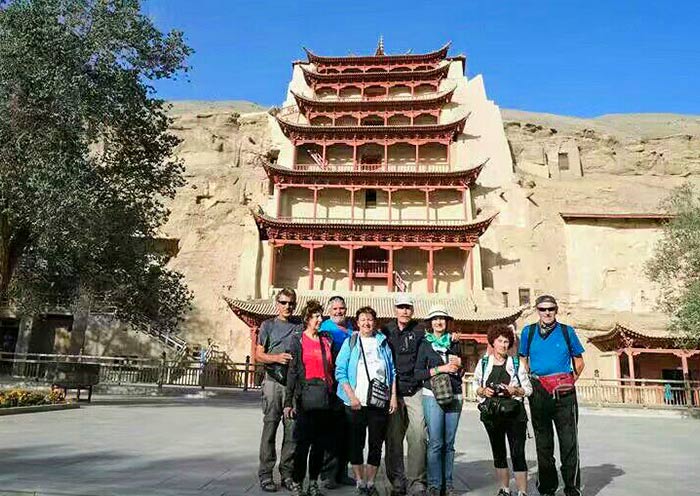
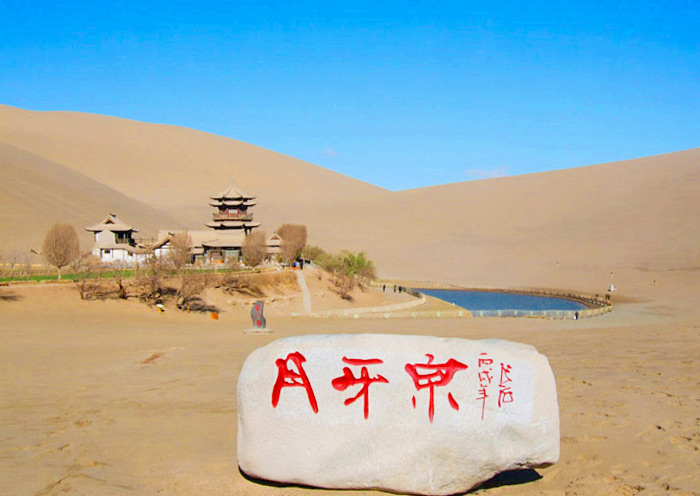
Travel with Asia Odyssey Travel (AOT) to Explore Dunhuang, Gansu
Travel to Dunhuang with Asia Odyssey Travel (AOT) and discover the stunning treasures of the Silk Road in Gansu, China. With years of expertise in crafting tours in Northwestern China, AOT offers a variety of customizable tour packages that cater to all types of travelers.
Tour Packages: Dunhuang Tours
Popular Attractions: Mogao Caves, Hexi Corridor
Dunhuang Travel Guide: Dunhuang Attractions, Best Time to Visit Dunhuang, Dunhuang Map
Dunhuang Transportation: How to Get to Dunhuang, Beijing to Dunhuang, Xi’an to Dunhuang, Zhangye to Dunhuang
Extend Your Trip to Gansu & Silk Road
Tour Packages: Gansu Tours, Silk Road Tours, Silk Road Group Tours, China Silk Road Tours, China Northwest Tours
Gansu Destinations: Lanzhou, Dunhuang, Zhangye, Jiayuguan
Gansu Travel: Gansu Travel Guide, Gansu Travel Tips, Gansu Maps, Gansu Attractions, How to Plan a Gansu Tour
Silk Road Travel: Silk Road Travel Guide, Silk Road Cities, Silk Road Trip Planning Guide, Silk Road Itinerary, Silk Road Attractions, Silk Road Map, Silk Road Facts
